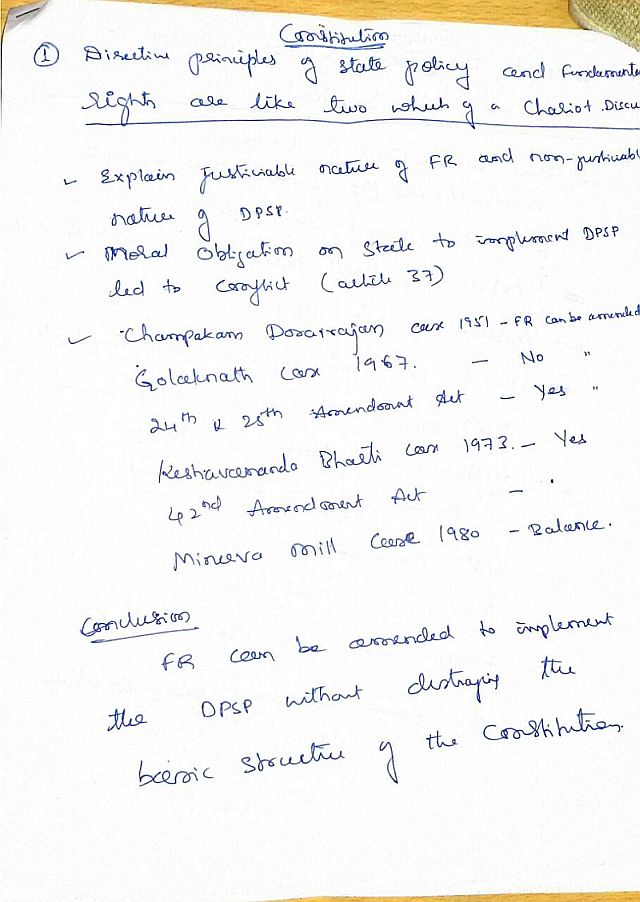Directive Principles of State Policy and Fundamental Rights are like two wheels of a chariot. Discuss.
Note:
Submit your answers in the comment section below.
You can either
- type the answer in the comment section
- or take images of answer written on paper and upload it the comment section.
******************************************************
Model answer structure:



The justiciability of Fundamental Rights and non-justiciability of Directive Principles and the moral obligation of State to implement Directive Principles (Article 37) have led to a conflict between the two since the commencement of the Constitution.
In the Champakam Dorairajan case” (1951), the Supreme Court ruled that in case of any conflict between the Fundamental Rights and the Directive Principles, the former would prevail.
The Parliament reacted to the Supreme Court’s judgement in the Golaknath Case (1967) by enacting the 24th Amendment Act (1971) and the 25th Amendment Act (1971). The 24th Amendment Act declared that the Parliament has the power to abridge or take away any of the Fundamental Rights by enacting Constitutional Amendment Acts.
In kesavananda Bharathi case (1973), the 42nd Amendment Act accorded the position of legal primacy and supremacy to the Directive Principles over the Fundamental Rights conferred by Articles 14, 19 and 31.
However, this extension was declared as unconstitutional and invalid by the Supreme Court in the Minerva Mills case25 (1980). It means that the Directive Principles were once again made subordinate to the Fundamental Rights. But the Fundamental Rights conferred by Article 14 and Article 19 were accepted as subordinate to the Directive Principles specified in Article 39 (b) and (c).
The goals set out by the Directive Principles have to be achieved without the abrogation of the means provided by the Fundamental Rights’. Therefore, the present position is that the Fundamental Rights enjoy supremacy over the Directive Principles. Yet, this does not mean that the Directive Principles cannot be implemented. The Parliament can amend the Fundamental Rights for implementing the Directive Principles, so long as the amendment does not damage or destroy the basic structure of the Constitution.
Very good answer.
Good use of examples, and good structuring, especially the conclusion part.
Answers attached
ಮೂಲಭೂತಹಕ್ಕುಗಳು ಮತ್ತು ರಾಜ್ಯ ನಿರ್ದೇಶಕ ತತ್ವಗಳು ಸಂವಿಧಾನ. /ಸರಕಾರ ಎಂಬ ರಥದ ಎರಡು ಗಾಲಿಗಳಿದ್ದಂತೆ. ಭಾರತದ ಪ್ರಜಾಪ್ರಭುತ್ವದ ಯಶಸ್ಸಿಗೆ ಸಂವಿಧಾನದ ೩ ಮತ್ತು೪ ನೇ ಭಾಗಗಳು ಅಗತ್ಯವಾಗಿದೆ. ಈ ಎರಡೂ ಭಾಗಗಳನ್ನು ಗ್ರಾನ್ ವಿಲ್ಲೆ ಆಸ್ಟಿನ್ ‘ಸಂವಿಧಾನದ ಆತ್ಮ’ ಎಂದರೆ,ಜೆ.ಸಿ. ಜೋಹಾರಿ ‘ ಸಂವಿಧಾನದ ೪ ನೇ ಭಾಗವನ್ನು ೩ ನೇ ಭಾಗದ ಸಿಸ್ಟರ್ ಪಾರ್ಟ್ ‘ ಎಂದಿದ್ದಾರೆ.
ಎನ್.ಎ.ಪಾಲ್ಕಿವಾಲರು ‘ ನೀರ್ದೇಶಕ ತತ್ವಗಳು ಸರಕಾರದ ನೀರ್ದೇಶಿತ ಗುರಿಗಳಾದರೆ , ಹಕ್ಕುಗಳು ಆ ಗುರಿ ಸಾಧಿಸುವ ಸಾಧನಗಳಾಗಿವೆ. ಹಕ್ಕುಗಳು ರಾಜಕೀಯ ಪ್ರಜಾಪ್ರಭುತ್ವಕ್ಕೆ ಸಹಾಯಕವಾಗಿದ್ದರೆ, ನೀರ್ದೆಶಕ ತತ್ವಗಳು ಆರ್ಥಿಕ, ಸಾಮಾಜಿಕ. ಪ್ರಜಾಪ್ರಭುತ್ವವನ್ನು ಸ್ಥಾಪಿಸಲು ಸಹಾಯಕ. ಹಕ್ಕುಗಳು ರಾಜ್ಯಕ್ಕೆ ಆಜ್ಞೆ ನೀಡುವ ಮೂಲಕ ಪ್ರಜಾಪ್ರಭುತ್ವದ. ವಿರೋಧಿ ಕೆಲಸ ಮಾಡದಂತೆ ತಡೆಯುವುದು. ತತ್ವಗಳು ರಾಜ್ಯಕ್ಕೆ ಸ್ಪಷ್ಟ. ಸೂಚನೆ ನೀಡಿ ದೇಶದ ಆರ್ಥಿಕ ಏಳಿಗೆಗೆ, ಸಾಮಾಜಿಕ ಪ್ರಗತಿಗೆ ಹೋರಾಡುವಂತೆ ಆದೇಶ ನೀಡುತ್ತದೆ.ಪ್ರಜೆಗಳಿಗೆ ಮೂಲಭೂತ ಹಕ್ಕುಗಳ. ಮೌಲ್ಯ ಅರಿಯಬೇಕಾದರೆ ಮತ್ತು ಅವನ್ನು ಅನುಭವಿಸಬೇಕಾದರೆ ಅವರ. ಆರ್ಥಿಕ. ಸಾಮಾಜಿಕ ಸ್ಥಿತಿಗತಿಗಳು ಅಭಿವೃದ್ಧಿಗೊಳ್ಳಬೇಕು.ಇವೆರಡರ ನಡುವೆ ಘರ್ಷಣೆ,ಭಿನ್ನಾಭಿಪ್ರಾಯಗಳು ಬರಬಾರದು.
ಘರ್ಷಣೆ, ಭಿನ್ನಾಭಿಪ್ರಾಯಗಳು ಇಲ್ಲದೆ ಇವುಗಳ ಮೂಲಕ ಸಾಮಾಜಿಕ ಕ್ರಾಂತಿ ಉಂಟು ಮಾಡಿ ಪ್ರಸ್ತಾವನೆಯಲ್ಲಿ ಚಿತ್ರಿಸಿದ ಸುಖೀ ರಾಜ್ಯವನ್ನು ಕಟ್ಟಬಹುದು. ತತ್ವಗಳನ್ನು ಕಾರ್ಯಗತ ಮಾಡದ ಹೊರತು ವ್ಯಕ್ತಿ ತನ್ನ ಹಕ್ಕುಗಳನ್ನು ಅನುಭವಿಸಲು ಬೇಕಾದ ಪರಿಸ್ಥಿತಿ ಹೊಂದಲು ಸಾಧ್ಯವಿಲ್ಲ. ಆದ್ದರಿಂದಲೇ ಇವೆರಡು ರಥದ ಎರಡು ಗಾಲಿಗಳೆಂದಿದ್ದಾರೆ.
The FR form the part 3 and DPSP form the part 4 of the constitution.
the fr’s are justifiable part of the constitution ie when they are infringed , the aggrieved can go to the court for justice. whereas the dpsp’s are not justifiable. as dr ambedkar said they are they are the ” instruments of instructions ” for the state to be kept in mind while making the policies.
both fr and dpsp are necessary as they cannot take each others place.
the concept of free society has been embodied in the fr’s.
the concept of social transformation is given by the dpsp.
as free society and socio economic transformation are necessary for the society. the fr and dpsp form the 2 wheels of a chariot.
Quote examples / cases.
Will add more value to answers.